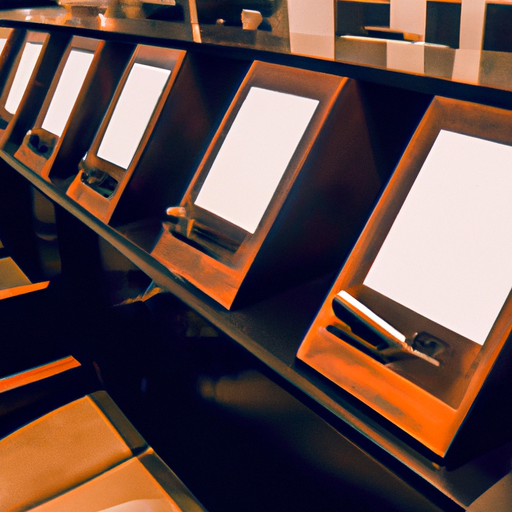
The Impact of Digital Transformation on the Hospitality Industry
Digital Transformation: The Evolution of the Hospitality Industry in the Web3 Era
The Impact of Digital Transformation on the Hospitality Industry
In today’s fast-paced world, digital transformation has become a buzzword across industries. The hospitality industry, in particular, has witnessed a significant impact due to this technological revolution. From booking accommodations to personalized experiences, digital transformation has revolutionized the way hotels and other hospitality businesses operate.
One of the most noticeable changes brought about by digital transformation is the shift in customer behavior. With the advent of online travel agencies and review platforms, travelers now have access to a wealth of information at their fingertips. They can compare prices, read reviews, and make informed decisions about where to stay. This has forced hotels to adapt and provide a seamless online experience to attract and retain customers.
The rise of mobile technology has also played a crucial role in the digital transformation of the hospitality industry. Today, travelers can book accommodations, check-in, and even unlock their hotel rooms using their smartphones. This convenience has not only improved the customer experience but has also streamlined operations for hotels. With mobile check-ins, hotels can reduce long queues at the front desk and allocate resources more efficiently.
Furthermore, digital transformation has enabled hotels to personalize their services like never before. By leveraging data analytics and artificial intelligence, hotels can now gather insights about their guests’ preferences and tailor their offerings accordingly. From personalized recommendations to customized room amenities, hotels can create unique experiences that cater to individual needs. This level of personalization not only enhances customer satisfaction but also increases loyalty and repeat business.
Another significant impact of digital transformation on the hospitality industry is the rise of online reputation management. With the proliferation of social media and review platforms, hotels are under constant scrutiny. A single negative review can tarnish a hotel’s reputation and deter potential guests. As a result, hotels have had to invest in online reputation management tools and strategies to monitor and respond to customer feedback promptly. This has become an essential aspect of maintaining a positive brand image in the digital age.
Moreover, digital transformation has opened up new avenues for revenue generation in the hospitality industry. Hotels can now leverage online platforms to offer additional services and experiences to their guests. From partnering with local tour operators to providing exclusive access to events, hotels can create unique packages that go beyond traditional accommodation offerings. This not only diversifies revenue streams but also enhances the overall guest experience.
In conclusion, digital transformation has had a profound impact on the hospitality industry. From changing customer behavior to enabling personalized experiences, technology has revolutionized the way hotels and other hospitality businesses operate. The rise of mobile technology, data analytics, and online reputation management has further accelerated this transformation. As we enter the Web3 era, it is crucial for hotels to embrace digital transformation and leverage technology to stay competitive in an increasingly digital world. By doing so, they can not only enhance the customer experience but also drive revenue growth and build a strong brand presence in the digital landscape.
Leveraging Web3 Technologies for Enhanced Guest Experiences in Hospitality

Digital Transformation: The Evolution of the Hospitality Industry in the Web3 Era
The hospitality industry has always been known for its commitment to providing exceptional guest experiences. From luxurious accommodations to personalized services, hotels and resorts have continuously strived to exceed customer expectations. However, with the advent of Web3 technologies, the industry is undergoing a digital transformation that is revolutionizing the way guests interact with hospitality establishments.
Web3 technologies, such as blockchain and decentralized applications (dApps), are enabling hotels and resorts to leverage the power of the internet in new and exciting ways. These technologies are not only enhancing guest experiences but also streamlining operations and improving overall efficiency.
One of the key benefits of Web3 technologies in the hospitality industry is the ability to create a more personalized and seamless guest experience. With blockchain, hotels can securely store and access guest preferences, allowing them to tailor their services to individual needs. For example, a guest who prefers a certain type of pillow or has dietary restrictions can have their preferences recorded on the blockchain, ensuring that their needs are met every time they visit.
Decentralized applications are also playing a crucial role in enhancing guest experiences. These dApps can be used to create virtual concierge services, allowing guests to easily access information about the hotel, make reservations, and even order room service, all from their smartphones. This not only saves time for guests but also reduces the workload for hotel staff, allowing them to focus on providing personalized services.
Web3 technologies are also revolutionizing the way hotels and resorts handle payments. With blockchain, transactions can be securely recorded and verified, eliminating the need for intermediaries such as banks. This not only reduces transaction costs but also ensures faster and more secure payments for both guests and establishments. Additionally, blockchain-based loyalty programs are being implemented, allowing guests to earn and redeem rewards seamlessly across different hotels and resorts.
Another area where Web3 technologies are making a significant impact is in the area of sustainability. With blockchain, hotels can track and verify their sustainability initiatives, such as energy consumption and waste management. This not only allows establishments to showcase their commitment to sustainability but also provides guests with transparency and assurance that their stay is environmentally friendly.
Furthermore, Web3 technologies are enabling hotels and resorts to collaborate and share data securely. With blockchain, establishments can securely share guest information, such as preferences and booking history, with partner hotels and service providers. This allows for a seamless and personalized experience for guests, even when they are traveling between different establishments.
In conclusion, the hospitality industry is undergoing a digital transformation in the Web3 era. Web3 technologies, such as blockchain and decentralized applications, are revolutionizing the way hotels and resorts operate, enhancing guest experiences, streamlining operations, and improving overall efficiency. From personalized services to seamless payments and sustainability initiatives, Web3 technologies are reshaping the hospitality industry for the better. As the industry continues to embrace these technologies, guests can expect even more exceptional experiences in the future.
Exploring the Future of Hospitality in the Web3 Era
Digital Transformation: The Evolution of the Hospitality Industry in the Web3 Era
The hospitality industry has always been known for its ability to adapt and evolve with the changing times. From the early days of inns and taverns to the rise of luxury hotels and resorts, the industry has continuously embraced new technologies and trends to enhance the guest experience. In today’s digital age, the hospitality industry is once again at the forefront of innovation, as it navigates the Web3 era and embraces the concept of digital transformation.
Digital transformation refers to the integration of digital technologies into all aspects of a business, fundamentally changing how it operates and delivers value to its customers. In the hospitality industry, this means leveraging the power of the internet, mobile devices, and emerging technologies to create a seamless and personalized guest experience.
One of the key drivers of digital transformation in the hospitality industry is the rise of Web3 technologies. Web3, also known as the decentralized web, is the next evolution of the internet that aims to give users more control over their data and online interactions. With Web3, individuals can own and control their data, participate in decentralized networks, and engage in peer-to-peer transactions without the need for intermediaries.
In the Web3 era, the hospitality industry is exploring new ways to leverage blockchain technology to enhance transparency, security, and efficiency. Blockchain, a decentralized and immutable ledger, can be used to streamline processes such as booking, payment, and identity verification. By eliminating the need for intermediaries, blockchain can reduce costs, increase trust, and improve the overall guest experience.
Another area where digital transformation is making a significant impact is in guest engagement and personalization. With the proliferation of mobile devices and social media, guests now have more control over their travel experiences than ever before. Hotels and resorts are leveraging digital technologies to engage with guests throughout their journey, from the moment they start researching their trip to the post-stay feedback.
For example, hotels are using mobile apps to allow guests to check-in and check-out seamlessly, access their room key digitally, and request services or amenities. These apps also enable hotels to send personalized offers and recommendations based on guest preferences and behavior, creating a more tailored and memorable experience.
Furthermore, digital transformation is enabling hotels to gather and analyze vast amounts of data to gain insights into guest preferences and behavior. By leveraging technologies such as artificial intelligence and machine learning, hotels can personalize marketing campaigns, optimize pricing strategies, and improve operational efficiency.
In the Web3 era, the hospitality industry is also exploring the potential of virtual and augmented reality to enhance the guest experience. Virtual reality allows guests to explore destinations and hotel rooms before making a booking, while augmented reality can provide interactive and immersive experiences during their stay. These technologies not only help hotels differentiate themselves in a competitive market but also provide guests with a unique and memorable experience.
In conclusion, the hospitality industry is undergoing a digital transformation in the Web3 era. By embracing emerging technologies such as blockchain, mobile apps, artificial intelligence, and virtual reality, hotels and resorts are enhancing the guest experience, improving operational efficiency, and staying ahead of the competition. As the industry continues to evolve, it is essential for hospitality businesses to embrace digital transformation and leverage the power of technology to create a seamless and personalized guest experience in the Web3 era.


